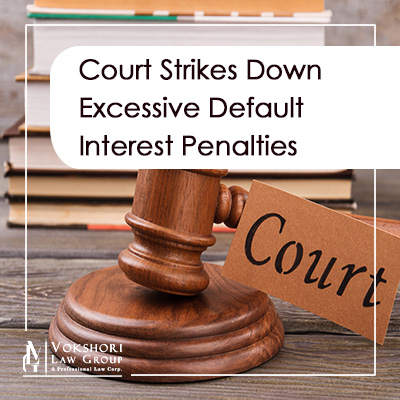
In a landmark decision that has significant implications for borrowers, the California Court of Appeal in Honchariw v. FJM Private Mortgage Fund, LLC ruled that excessive default interest and late fees in non-consumer loans can be deemed unenforceable penalties. This ruling serves as a critical reminder for borrowers to be vigilant about the terms of their loan agreements and offers a pathway to challenge unfair penalty provisions.
Case Background
Nicholas and Sharon Honchariw borrowed $5.6 million from FJM Private Mortgage Fund, LLC, secured by commercial real estate. Their loan agreement included an interest rate of 8.5% per annum, a 10% late fee on missed payments, and a default interest rate that increased to 18.49% upon any default. When the Honchariws missed a payment of $39,667 on September 1, 2019, these penalty provisions were triggered, leading to a dispute over their enforceability.
The Honchariws sought arbitration, arguing that the penalties were excessive. The arbitrator upheld the lender’s provisions, but the case was subsequently reviewed by the courts. The California Court of Appeal ultimately ruled that these combined penalties were unreasonable and unenforceable.
Key Legal Findings
Under California Civil Code Section 1671(b), liquidated damages clauses in non-consumer contracts are presumed valid unless proven unreasonable when made. The Court of Appeal found that the combined late fee and default interest rate in the Honchariw case constituted a “penalty” rather than a reasonable estimate of the lender’s probable loss from the default. This decision was heavily influenced by the precedent set in Garrett v. Coast & Southern Federal Savings & Loan Assn., which requires that liquidated damages must reasonably relate to actual damages incurred.
In Garrett, the lender’s sin was to impose a late fee of 2%, but to impose it, not on the amount of the missed installment (like ordinary late fees, including the one in the Honchariw case), but on the full balance of the loan. The Garrett court had no trouble holding this was an invalid penalty.
The Court in Honchariw ruled that imposing a 10% late fee along with an almost 10% increase in the interest rate on the entire loan balance was excessive. It noted that these combined penalties did not represent the actual costs or damages the lender would face due to a missed payment. Therefore, the court found these terms unenforceable under California law.
Default interest is calculated based on the duration of the default. If a missed payment is corrected, the interest rate returns to the standard rate. For instance, the Honchariws missed a $39,667 payment on September 1, 2019. If they had made the payment five days later, on September 6, they would have incurred about $11,500 in extra interest. This amount is clearly punitive rather than a reasonable estimate of damages. Even when combined with the actual late fee of $3,396, it pales in comparison to the 2% late fee of the principal balance in the Garrett case, which would have been $168,000!
This ruling contrasts with many other default interest cases across the country, where increases of 4% to 6% are typically upheld. However, the nearly 10% increase in this case is exceptionally high, although some rare cases approve even higher rates. Conversely, several bankruptcy courts consider late fees and default interest as overlapping and have rejected enforcing default interest. For example, in the case of In re AE Hotel Venture, the court did not enforce default interest.
Other Rulings by the Court
Beyond invalidating the penalty provisions, the court also made significant procedural rulings:
-
Review of Arbitrator’s Decision:
The court highlighted that, while an arbitrator’s award is typically final and not subject to judicial review for errors of fact or law, an exception exists if the award violates a party’s unwaivable statutory rights or contravenes an explicit legislative expression of public policy. In this case, the Court of Appeal reviewed the arbitrator’s decision de novo because it found that the arbitrator’s enforcement of the penalty clauses violated the public policy expressed in California Civil Code Section 1671.
-
Clarification on Liquidated Damages:
The court reinforced that liquidated damages provisions must bear a reasonable relation to the probable actual loss that the lender is likely to sustain. This clarification is crucial for both lenders and borrowers in drafting and reviewing loan agreements.
Implications for Borrowers
This ruling is particularly beneficial for borrowers, offering them a legal precedent to challenge exorbitant penalty provisions in their loan agreements. Here are some key takeaways for borrowers:
-
Review Loan Agreements Carefully:
Borrowers should scrutinize the penalty clauses in their loan agreements. Provisions that impose excessive fees or interest rates upon default may be legally challenged based on this ruling.
-
Legal Recourse Against Unfair Penalties:
Borrowers now have a pathway to contest penalties that appear punitive rather than compensatory. If faced with high default interest rates or late fees, borrowers can seek legal advice to determine if these penalties can be challenged under the Honchariw precedent.
-
Importance of Timely Payments:
While this ruling provides protections against excessive penalties, it also underscores the importance of making timely payments to avoid triggering such clauses in the first place.
Conclusion
The Honchariw v. FJM Private Mortgage Fund, LLC case is a significant victory for borrowers, reinforcing the principle that penalties in loan agreements must be reasonable and related to actual damages. It’s much easier to find support and analogies for a clause in the 4% to 6% range; indeed, the very choice of 9.99% looks suspicious here.
This decision empowers borrowers to challenge unfair penalty provisions and ensures that lenders cannot impose excessive charges that go beyond reasonable compensation for missed payments.
The cases cited to in this article can be found at:
Honchariw v. FJM Priv. Mortg. Fund, LLC, 83 Cal. App. 5th 893, 299 Cal. Rptr. 3d 819 (2022), reh’g denied (Oct. 26, 2022), review denied (Dec. 21, 2022)
Garrett v. Coast & S. Fed. Sav. & Loan Assn., 9 Cal. 3d 731, 511 P.2d 1197 (1973)
In re AE Hotel Venture, 321 B.R. 209, 44 Bankr. Ct. Dec. (CRR) 92 (Bankr. N.D. Ill. 2005).






